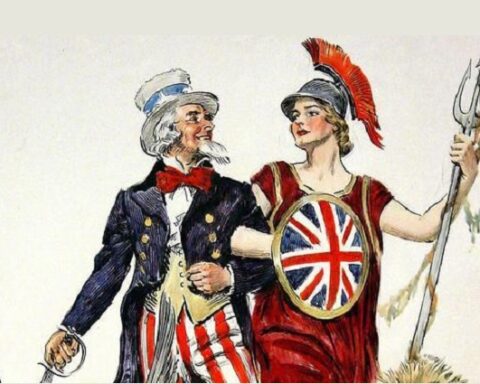Week before last I went to Wesleyan and read “A Good Man Is Hard to Find.” After it I went to one of the classes where I was asked questions. There were a couple of young teachers there and one of them, an earnest type, started asking the questions. “Miss O’Connor,” he said, “why was the Misfit’s hat black?” I said most countrymen in Georgia wore black hats. He looked pretty disappointed. Then he said, “Miss O’Connor, the Misfit represents Christ, does he not?” “He does not,” I said. He looked crushed. “Well, Miss O’Connor,” he said, “what is the significance of the Misfit’s hat?” I said it was to cover his head; and after that he left me alone. Anyway, that’s what’s happening to the teaching of literature.
– Flannery O’Connor
Halfway through The Habit of Being, the tome of Flannery O’Connor’s collected letters, there is a cryptic sentence offered to O’Connor’s friend and professor, William Sessions. It is made more brilliant in that it was an off-handed postscript:
- S. She is full of Theory. The Theories are worse than the Furies.
Though we don’t know to whom O’Connor was referring, we are abundantly clear how she feels about her.
Now, for those unfamiliar with Greek and Roman mythology, the Furies were three sister goddesses who dwelled in the Underworld until summoned for vengeance. They were Alecto (endless anger), Megaera (jealous rage), and Tisiphone (vengeful destruction). Born out of the blood spilled from the titan son Cronus’ vicious castration of his own father, they hectored and harried, tortured and tormented those who violated a moral precept or legal code, especially those pertaining to offending the gods or family honor. Most famously, Orestes, who avenged the murder of his father Agamemnon by killing his own mother Clytemnestra, was relentlessly pursued in his unatoned guilt by the hellish Furies.
The Theories to which O’Connor is referring, however, are the fashionable literary postulates that distract from the story and wallow its readers in abstraction. After reading an outlandish interpretation of her short story, A Good Man Is Hard to Find, O’Connor fumed,
The interpretation of your ninety students and three teachers is fantastic and about as far from my intentions as it could get to be. If it were a legitimate interpretation, the story would be little more than a trick and its interest would be simply for abnormal psychology. I am not interested in abnormal psychology. … Too much interpretation is certainly worse than too little, and where feeling for a story is absent, theory will not supply it.
Crestfallen at the state of the academy and the stunted students they were teaching, O’Connor mourned, “My tone is not meant to be obnoxious. I am in a state of shock.”
Like the Furies of Greek and Roman literature, the Theories are everywhere. Now understand, observing the way the world conducts itself and then framing a theory around that which is witnessed is a normal way to operate. We would be lost if we navigated the world with forever-new particulars unaided by overarching themes and a guiding sense of cause and effect. But it is the worship of Theory and its zealous misapplication that O’Connor most vigorously rejects.
Forever, there has been a drunkenness on Theory. The dreamy sophists in ancient times, the haughty thinkers during the Enlightenment, and the siloed experts in the modern age have crafted baffling theories unchastened by nature and untethered from reality. Shortly after the scientific method was devised, it was radicalized by those who felt that everything was subject to it, and anything that fell outside the ambit of the scientific method was either poppycock or irrelevant.
A perfect example of such obeisance to the Theories was a debate that pitted the starry-eyed scientism of Harvard professor Steven Pinker against the philosophic sure-footedness of literary critic Leon Wieseltier. The topic? The proposed role of science in “purifying” the humanities. Responding to all the “wondrous means” by which science can technically deconstruct (and yet somehow augment) literature, Wieseltier sighed,
How art works is not the most penetrating question that can be asked about it. Many years ago I attended a lecture by Roman Jakobson on patterns of consonant placement in Baudelaire’s “Le Chat,” and it was the least enlightening discussion of a poem I ever heard. “Behavioral genetics can update folk theories of parental influence with discoveries about the effects of genes, peers, and chance, which have profound implications for the interpretation of biography and memoir.” Profound? I think not. Whatever its genetic roots, a man’s experience of his father is his experience of his father, and the representation of that relationship in a biography or a memoir demands empathy and probity more than a hunt for phenotypes.
Exuberant acolytes of the Theories get it all wrong. Before an architect draws up his plans, he must survey the ground. Someone once observed that Adam Smith drew up The Wealth of Nations after witnessing the bartering in the local market, whereas Karl Marx crafted the Communist Manifesto in the isolated, smothering stacks of the British Library. Paradoxically, originators and adherents of the Theories (who boast their inveterate rootedness in science) have a tendency to lazy credulity. Not understanding the square peg of human nature, they force it violently through the round hole of the Theory.
Certain modern activists latch onto arcane theories surrounding race and gender, economics, and political philosophy. Fueled with righteous indignation, ivory-tower intellectualism, and oversimplification, they lash out at the way things are and impatiently insist upon the way things ought to be. After all, it feels good to be right—to know how to fix something reinforces our sense of value in a world of ineptitude. And it feels good to be angry, fired with passion so as to live a meaningful life. But, as O’Connor would warn, “Conviction, without experience makes for harshness.” The results are not only destructive, but ineffective. The Theories, it turns out, don’t reckon with pesky nuances like human free will and brokenness, biological facts, and political realities. And yet, when these Theories inevitably fail in their real-world application, activists refuse to learn and, instead, double down on their implementation. We have repeatedly been told that Communism, for example, “works.” It only needs a “proper application.” The natural consequence of such thinking is smoldering ash instead of exuberant life.
Reductionist, de-contextualized, and warped out of all proportion, the Theories curiously cause people to stop thinking. “Studies show” and “research claims,” “the experts agree” and “science insists,” are the openings to most sentences from the Theories. And yet, the true thinker counters with “What studies?” and “What quality?” and “Who was studied?” and “Toward what end?” Even more importantly, healthy skeptics (not vain contrarians) of the Theories ceaselessly ask how the Theories comport with one’s experience and insight, intuition and common sense. The ultimate purifier of the Theories is the inexhaustible question, “Does this make sense?”
The Theories, like the Furies, are unrelenting. They are like a swarm of bees. A casual perusal of the news will inform you that “What you see isn’t, in fact, what is! Listen to our [fill-in-the-blank] theory!” Political theories and social theories, medical theories and philosophical theories, religious theories and literary theories inundate us. Some of them are good. Many of them are just plain awful.
In a 1961 interview with Esquire magazine, William F. Buckley Jr. famously admitted, “I would rather be governed by the first two thousand people in the telephone directory than by the Harvard University faculty.” That’s because Harvard is plagued by the Theories.
Are you?
* Tod Worner is a practicing internal medicine physician. He serves as editor-in-chief of Bishop Robert Barron’s Evangelization & Culture Online. He also edits and writes for Evangelization & Culture, the Journal of the Word on Fire Institute, and hosts the Evangelization & Culture Podcast.






